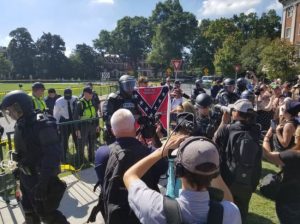
Just weeks after the Charlottesville protests on August 12th, Tennessee-based group CSA II: The New Confederate States of America came together Saturday to hold a “Heritage Not Hate” rally on Richmond’s Monument Avenue.
With many hoping to steer clear of a repeat of the August chaos in Charlottesville, city and state officials ensured a heavy police presence and banned attendees from carrying weapons or wearing masks at the rally.
“Our greatest fear was the fear of the unknown,” said Richmond Police Chief Alfred Durham in a statement. “We had to plan for a lot of possible scenarios which, fortunately, didn’t materialize.”
Unlike the protests in Charlottesville, Saturday’s events were calmer than anticipated. Despite the presence of roughly a dozen Confederate monument supporters and 300 counter protesters, authorities claimed that there were no injuries and only seven arrests.
Monument Avenue, the site of the event, is an iconic Richmond road that is lined with some of the oldest and largest Confederate statues in the nation. Members of CSA II stood in front of the street’s Robert E. Lee memorial, announcing their goal of “raising awareness about the Confederacy.”
Richmond native Erin Flores, a second year student at UVa, said she felt disturbed upon hearing about the protest.
“The events in Charlottesville were really violent,” she explained. “I was hoping that the same thing would not happen in Richmond.”
The ultimate lack of violence and chaos was in many ways due to the expansive efforts employed by the city. Maris Crump, a freshman at Virginia Commonwealth University in Richmond, said that Saturday’s police presence was overwhelming.
“It was eerie; you couldn’t even get into the library,” she explained. “Security was everywhere… there are usually lots of people walking around on Saturday, but there was no one.”
VCU is just a few minutes from the Lee statue, so close that the University decided to send students an email warning them to stay away from the rally.
“They were trying to avoid another Charlottesville,” Maris said. “But people were scared. My mom was calling me and telling me not to go outside.”
Although the protest turned out to be relatively peaceful, many Virginians believe that this trend of protests is just starting. We are then left grappling with the question of how to resolve the issue at hand: should the Confederate statues be removed?
Having faced this question head-on, both Crump and Flores are clear that the answer is a definite yes.
“I do think that it’s important to acknowledge what happened, but the reason that a lot of those statues went up was not for historical purposes; it was for white supremacy purposes,” Flores explained. “The statues stand for a lot more than just history, so I do think it’s important to take them down.”
Crump reached the same conclusion: removing the memorials has to be a priority.
“There are no swastikas in Germany,” she noted. “Why do we have a whole avenue of Confederate statues?”
The unfortunate reality, however, is that both options of removing or keeping the statues offer the potential for continued anger and violence. Perhaps because of this, Governor McAuliffe released a statement strongly urging citizens to avoid counter protesting at Saturday’s event. He explained that “the best way to express that opposition is to avoid giving these hateful groups more attention than they deserve.”
But Crump was not convinced – she said that sometimes it is better to speak out.
“You know if there’s a counter protest that there’s going to be drama, but I feel like you should counter protest,” she explained. “You should stand up for what you believe in, especially if the issue is directed towards you.”
















